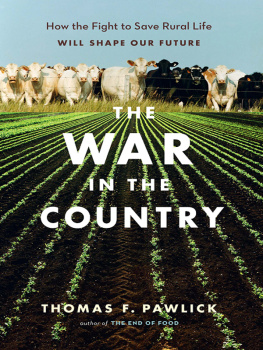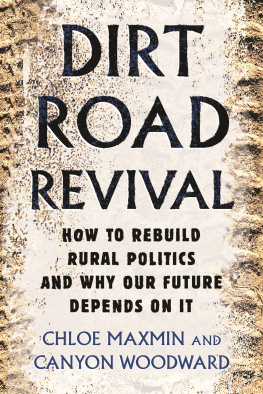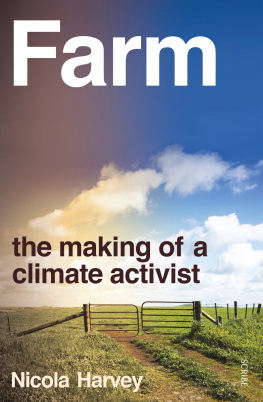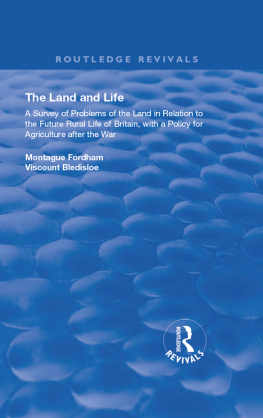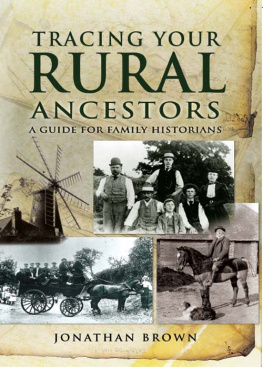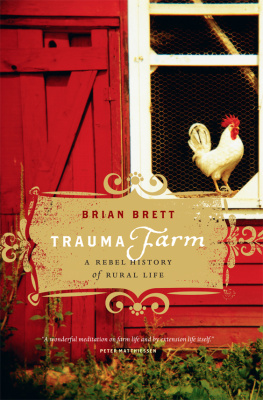THE WAR IN
THE COUNTRY
BY THE SAME AUTHOR
A Killing Rain
The Global Threat of Acid Precipitation
The Baringo Kid
Confrontations with Africa
The Invisible Farm
The Worldwide Decline of Farm
News and Agricultural Journalism Training
The End of Food
How the Food Industry Is Destroying Our Food
SupplyAnd What You Can Do About It
THOMAS F. PAWLICK
THE
WAR
IN THE
COUNTRY
How the Fight to Save Rural Life
WILL SHAPE OUR FUTURE

Copyright 2009 by Thomas F. Pawlick
09 10 11 12 13 5 4 3 2 1
All rights reserved. No part of this book may be reproduced, stored in a retrieval system or transmitted, in any form or by any means, without the prior written consent of the publisher or a license from The Canadian Copyright Licensing Agency (Access Copyright). For a copyright license, visit www.accesscopyright.ca or call toll free to 1-800 -893-57 77.
Greystone Books
A division of D & M Publishers Inc.
2323 Quebec Street, Suite 201
Vancouver bc Canada v5T 4s7
www.greystonebooks.com
Library and Archives Canada Cataloguing in Publication
Pawlick, Thomas
The war in the country : how the fight to save rural life will shape our future / Thomas F. Pawlick.
Includes bibliographical references and index.
ISBN 978-1-55365-340-0
1. North AmericaRural conditions.
2. North AmericaEnvironmental conditions. 3. OntarioRural conditions.
4. OntarioEnvironmental conditions. i. Title.
HT421.p39 2009 307.72097 C2009-902713-5
Copyediting by Pam Robertson
Cover and text design by Naomi MacDougall
Cover photographs Lecorre Productions/
Getty Images (top) and Ben Bloom/Getty Images (bottom)
Printed and bound in Canada by Friesens
Printed on acid-free paper that is forest friendly
(100% post-consumer recycled paper) and has been processed chlorine free
Distributed in the U.S. by Publishers Group West
We gratefully acknowledge the financial support of the Canada Council for the Arts,
the British Columbia Arts Council, the Province of British Columbia through the
Book Publishing Tax Credit, and the Government of Canada through the Book
Publishing Industry Development Program (bpidp) for our publishing activities.
for Fox y Grandpa
Beauty strip.
We left
a ribbon of trees,
covered the clearcut
hidden behind
with billboards
and signs,
screened the fine
criss-cross of
lines, of
marred earth and
scoured ground.
Look,
dont see.
We supply
surround sound,
soothing through
speakers,
muffle the animal
gasping and
groans, grunting
and moans,
The hissing of
strange-colored
clouds and seepings.
Dont hear.
Dont try to be too
clear.
None of it is really there,
no glow,
no smell in the air,
no dark soup
underground. The
surface looks calm,
as you cruise from
town to town,
cocooned, embalmed,
dont look,
dont stare.
Dont notice.
Contents
Our rural world, in nearly every country
on the planet, is in danger of extinction.
Traditional farmers were in tune with each
other, their community, and their environment.
Factory farmers look to mass production
for salvation, but reality doesnt match the dream.
Not everyone buys the corporate/government
lineand when they dont, all hell can break loose.
The marketing board system is
paved with good intentions.
Miners and speculators see bonanzas underground,
but those whose land they take see disaster.
The Mohawks confront, the Algonquins
out-maneuver, as they fight to save a way of life.
How corporate power and government regulation
combine to strangle small rural business.
Gunning for trouble along the confusing frontier
of the urban and rural mindsets.
Who can force a rewriting of the badly
skewed rules of the game?
Where to go to make your voice heard,
and to learn more about the issues.
Dreaming in colors: where this author is coming from.
( )
A Different Kind of Great Dying
Microcosm: a little world, a world in miniature
Websters Collegiate Dictionary
F OR AT LEAST SIXTY years in the industrial north of our planet, and for perhaps twenty-five or so in the rest of the world, a kind of Great Dying has been taking placenot the mass disappearance of endangered animal and plant species usually described or predicted by environmentalists, but a different kind of dying. This one, though it has had and will continue to have an ominously destructive impact on the environment, is not so much a biological phenomenon as a cultural one.
It is a uniquely human tragedy, caused by humans, and its consequences are yours, ourseveryones.
Our rural world is dying.
If a coroners inquest was looking for the cause of death, its jurors would have trouble pinning down a single one. A whole complex of factors is involved, playing off of each other like so many caroming pool balls at the break, or subatomic particles after colliding in a physicists accelerator.
Even pinpointing an original impetus, some force or movement that shattered stasis and started the whole thing movingthe action to which all else is reactionis problematic.
Perhaps that first force was simply greed, or more than that. Perhaps it was, in Cyrano de Bergeracs immortal dying words, a multitude:
Who are you? Are you a thousand? Ah, I recognize you, all my old enemies!
Falsehood? [he strikes with his epe]. Ha-ha! Compromise, prejudice, cowardice! [he strikes].
Am I bargaining with you? Never, never!
Ah, there you are, you, stupidity! I know in the end youll lay me low.
And it may yet. Most urban peopleand they represent the vast majority of the population (80 percent or more in most so-called developed countries)are, if not stupid, at least ignorant of whats happening. They dont know because no one has bothered to tell them.
This is the fault of our news media, which we can with some justification label truly stupid, or at least truly irresponsible, because they could easily know, and report, but havent done so. With a few honorable exceptions, mostly in Canada (the work of Andr Picard of Torontos Globe andMail springs to mind, along with that of tvOntario), theyre too busy chasing pop divas, celebs, and axe murderers, too focused on reporting such crucial events as the current size of Britneys breasts, or, as one major online news site recently headlined: How to keep your makeup from melting, to do the job of informing and educating that is supposed to be part of journalism. Worst of all is U.S. television.
I spent two years researching and writing a book about this, called The Invisible Farm. It was aimed at journalists, trying to alert them to the situation, and was published by a well-reputed house in Chicago. But like the proverbial tree that falls in the forest with no one there to hear, it made no sound.
And what is it that people dont know?
A Perverted System
They dont know that a perverted system, conceived and implemented by power elites with minimal democratic process, has captured those government departments charged with supervising the countryside, turning them into little more than an enforcement arm whose practical function is to create conditions that tend to wipe out: a) the family farm, b) rural small businesses, c) the culture and vitality of rural small towns, and d) the security and autonomy of all rural landowners, including retirees, back-to-the-landers, and other refugees from city stress.
Next page
